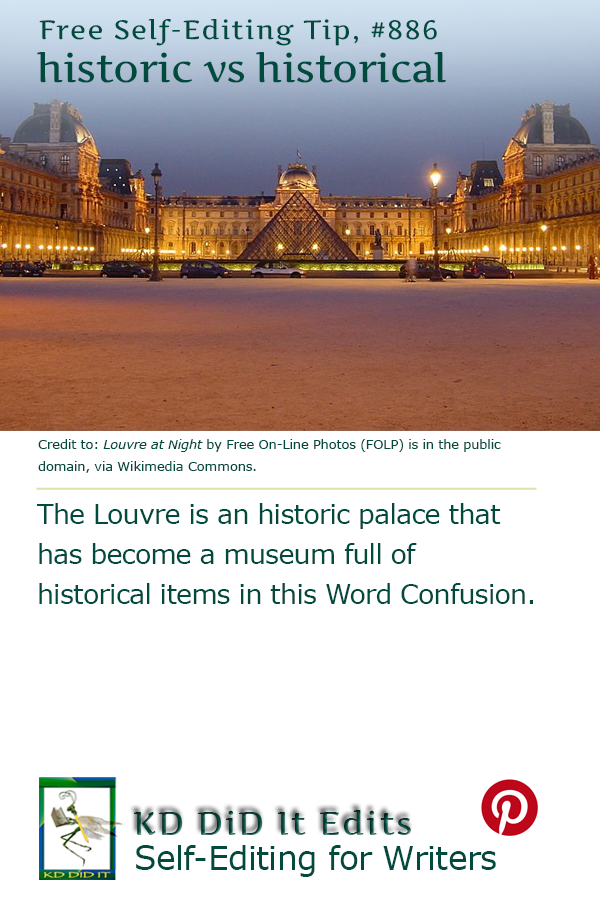You’ll have hysterics. No, really. Not only does a writer need to understand the subtle difference between historic and historical, but they also have to understand the even subtler use of a versus an.
Both historic and historical refer to history, obviously. The difference is that historic refers to something famous or important that actually happened in history. It’s a historic day, an event, in history.
“A historical study concerns history; a historic one makes history,” says Cook.
Something is historical if it happened in the past, speaks about the past, uses events from the past as inspiration, or describes something. An historical lecture that talks about something that happened, whereas an “historic lecture would in some way change the course of human events” (an1).
Does One Use A or An??
It’s all in how it sounds. Which indefinite article you use depends on how you pronounce historic or historical. I find that I sometimes sound the h…and sometimes I don’t sound it.
This confusion is based on past usage and often depended on whether the word came from the French who didn’t always pronounce the h at the start of words such as hotel, herb (unless you’re English), hour, honor, heir, etc. Contrast this “with some of those h-words no one would ever dream of putting an before like horrible, happy, hospital, or home” (Holdridge).
Vorfeld combines them as: “Look! An herb garden in a historical setting. Let’s stay an hour, then find a hotel.”
In “the Oxford English Corpus around a quarter of examples of historical are preceded with an rather than a” (an1).
Word Confusions…
…started as my way of dealing with a professional frustration with properly spelled words that were out of context in manuscripts I was editing as well as books I was reviewing. It evolved into a sharing of information with y’all. I’m hoping you’ll share with us words that have been a bête noir for you from either end.
If you found this post on “Historic versus Historical” interesting, consider tweeting it to your friends. Subscribe to KD Did It, if you’d like to track this post for future updates.
| Historic | Historical |
|---|---|
| Credit to: Apple Dictionary.com; Dictionary.com: historic, historical | |

9/11 World Trade Center Attack by 9/11 Photos is under the CC BY 2.0 license, via Flickr. — The attack on the World Trade Center is an historic event. |

A Gone With the Wind Pre-release Poster, 1967, is courtesy of Metro-Goldwyn-Mayer is in the public domain, via Wikimedia Commons. — The movie was based on an historical period in the Deep South. |
| Part of Grammar: | |
| Adjective | Adjective |
Famous or important in history, or potentially so
[Grammar; of a tense] Used in the narration of past events, especially Latin and Greek imperfect and pluperfect |
Of, concerning, pertaining to, treating, or characteristic of history or past events
Based on or reconstructed from an event, custom, style, etc., in the past Having once existed or lived in the real world, as opposed to being part of legend or fiction or as distinguished from religious belief Narrated or mentioned in history Noting or pertaining to analysis based on a comparison among several periods of development of a phenomenon, as in language or economics |
| Examples: | |
| We are standing on a historic site.
It was a time of historic change. Scientists know there were eruptions in historic times. Homicide was at an historic low. A verb tense, you will find that the historic present may also be referred to as dramatic present, narrative present, historical present, and historic past. When the present tense is used instead of the past in vivid narrative to give a sense of immediacy, it’s called historic past. |
I’m fascinated by the historical background to such studies.
Today, we’ll learn about famous historical figures in the late 18th century. Diana Gabaldon’s Outlander is an historical series that is very well written. For the Darwinians, biogeography became a historical science. Writers need to keep historical linguistics in mind when they’re writing historical novels — all part of the fun of writing. Are there any historical records left? We’re going to an historical reenactment of the battle of Gettysburg. There is cause to doubt that an historical Camelot ever existed. The book was a theologian’s study of the historical Jesus. |
| Derivatives: | |
| Adjective: nonhistoric, pseudohistoric, quasi-historic, semihistoric Noun: historicism, historicist |
Adjective: antihistorical Adverb: antihistorically, historically Noun: historicalness, historicity, historicization Verb: historicize, historicized, historicizing |
| History of the Word: | |
| Early 17th century, in the sense relating to or in accordance with history, via Latin from the Greek historikos, which is from historia meaning narrative, knowing by enquiry. | Late Middle English via Latin from the Greek historikos, see historic on the left. |
C’mon, get it out of your system, bitch, whine, moan…which words are your pet peeves? Also, please note that I try to be as accurate as I can, but mistakes happen or I miss something. Email me if you find errors, so I can fix them…and we’ll all benefit!
Satisfy your curiosity about other Word Confusions by exploring the index. You may also want to explore Formatting Tips, Grammar Explanations, and/or the Properly Punctuated.
Resources for Historic versus Historical
“an1.” Lexico.com. n.d. Web. 25 May 2020. <https://www.lexico.com/en/definition/an>.
The Chicago Manual of Style. 16th ed. University of Chicago Press, 2010. 5.72.
Cook, Claire Kehrwald. Line by Line. Houghton Mifflin Harcourt, 1985.
Harris, Muriel. Prentice Hall Reference Guide to Grammar & Usage (MLA). 5th Ed. Prentice Hall, 2003.
Holdridge, Catie. “Hit or Myth? Use An Before H-words.” 26 Nov 2011. Web. 26 May 2020. <https://www.writing-skills.com/hit-or-myth-use-an-before-h-words>.
Houghton, Peggy M., Ph.D., Timothy J. Houghton Ph.D., Michele M. Pratt, ed. The Gregg Reference Manual. 10th ed. Independently published, 2018. 1101.
Vorfeld, Judy. “A or An Before Words Beginning With H?” Editing and Writing Services. 6 Jan 2011. Web. 26 May 2020. <https://editingandwritingservices.com/a-or-an-before-words-beginning-with-h/>.
Pinterest Photo Credits:
Louvre at Night by Free On-Line Photos (FOLP) is in the public domain, via Wikimedia Commons.


